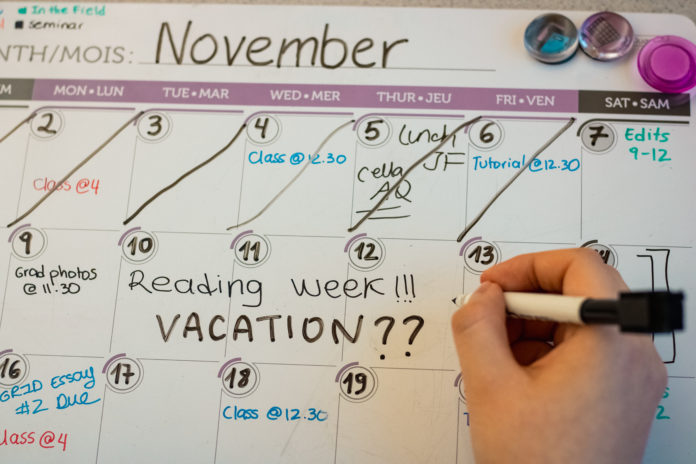
Reading week for students comes as a mile marker in the school year: after two months of grinding out essays, reading long textbook chapters and writing tests, students – and professors – finally get a break. However, while it seems like a relief from the stress, the timing of this year’s reading week for students and faculty, seems to have caused more stress than it seeks to reduce.
For the fall 2024 semester at St. Thomas University, reading week was scheduled a week later than usual, taking place from Nov. 11 to Nov. 15. The schedule change left three weeks of the semester before the start of final exams, much to disagreement from students and faculty.
Great Books Professor Matt Dinan said that fall semester reading week is a good idea in theory, but was not executed well this year.
“I think it is very poorly scheduled, because we had our reading week when there was only a month of the semester left and this does not reflect a serious pedagogical purpose for reading week,” he said.
The break typically falls on Nov. 4 to Nov. 8 — a date that Dinan feels is already too late in the semester.
Dinan highlighted further faculty opinion, expressing that he is not the first professor to disagree with the timing of the break.
“It’s a well-known complaint among the faculty that the students tend to be exhausted; some students don’t come back to class after reading week.”
With the reading week so late in the semester, Dinan said it makes it difficult for both students and professors. With three weeks left after the break, he said it is hard to assign work, but it is also difficult for students to do assignments or actually read.
“It’s not quite at the very end of the semester when you might have end-of-semester work, but it’s far too late for it to be useful for helping students rest before they get too exhausted.”
In Senate meetings discussing the scheduling of reading week, Dinan said that one of the arguments in favour of changing the dates was that with Remembrance Day being a holiday, some faculty members felt it made sense to roll it into the week off.
To that, Dinan argued that the reading week could be rolled into the Thanksgiving holiday. He decided to get opinions on the matter from students enrolled in classes at both STU and UNB.
“What they said was that having two weeks that were lighter [in classes] would be amazing,” said Dinan.
Emma Fackenthall is a fourth-year student who likes to spend her reading week brainstorming for final research papers, as well as recharging.
However, she explained, reading week taking place later in the semester proved a hindrance to this process.
“Reading week allows you to work on bigger assignments, but also have time to catch up with friends and do things that life is really about,” she said.
“Now that they’ve moved the reading week … I don’t really have enough time to consult with profs about my ideas and stuff before the papers are due.”
Fackenthall shared Dinan’s opinion that reading week should be scheduled in the middle of the semester.
“For me, that was a gaging point. It was like, ‘Okay, well, reading week, then I’ll have the rest of the semester. I’ll be halfway,’” she explained. “But, now it’s like … I have to do all this stuff in three weeks and I’m really overwhelmed.”
Emily Bessey, a fellow fourth-year student, shared Fackenthall’s sentiment of stress but noted that this year’s post reading week felt more stressful than previous years.
Bessey expressed her wish for one more week to wrap up her work before the end of the semester, especially with her busy fourth-year course load.
“It’s been weird coming back … post reading week always feels like a run to the finish line, but it felt especially last minute this year.”
While she is feeling the end-of-semester grind more than ever, for Bessey, the timing of reading week was not all bad; she spent the week on the Fine Arts department’s annual New York City fall trip.
Bessey explained that with the typical timing of reading week, the Fine Arts trip happens right before Christmas festivities begin in NYC. This meant that this year, the students were able to see the city at the start of the holiday season.
“It was really nice to get to see that because I’ve never gotten to see that before,” she said. “So I was trying to take in all of these things that I’ve never gotten to experience in New York before but, at the same time, in the back of my head, I was like, ‘I have so much homework to do.’”
In her ideal world, Bessey said the week would be scheduled at the beginning of November.
”I just feel like that extra week at the tail end of the semester, for a lot of students, is really helpful.”
Overall, the sentiment that Dinan, Fackenthall and Bessey shared was that an earlier reading week would stand to benefit students.
“The faculty for the most part want to be there for the students, so this stands out as an inconsistency,” said Dinan.
